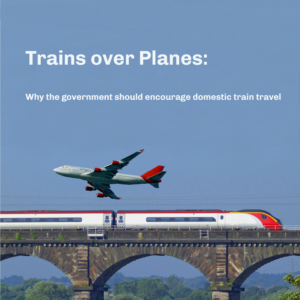In October the Intergenerational Foundation published a report arguing that the government should stop subsidising domestic air travel and ban short-haul domestic routes where comparable rail alternatives exist. Alec Haglund, IF Researcher, discusses the Department for Transport’s response to the policy recommendations set out in IF’s Trains over Planes report.

Why prioritise aviation?
The Intergenerational Foundation recently published a report, Trains over Planes, which calls for the government to ban short-haul mainland domestic flights with rail alternatives and to end its effective subsidisation of the domestic aviation industry. The analysis found that almost two-thirds of domestic aviation journeys on the mainland have rail alternatives which take either the same time, or only 30 minutes longer, when measured from city centre to city centre.
The report calls for the government to end domestic aviation subsidies and instead institute a ban on short-haul domestic aviation routes to encourage a modal shift to rail. In economic terms, the effect of these subsidies is that air travel is superficially cheapened. Given that air travel is at least seven times as polluting as travelling by rail, there are already negative externalities within the industry which are not accounted for in the price of a ticket.
We need action
The vast majority of people have now arrived at a consensus on the severity of the climate crisis and the urgent need for action on all fronts. Helping them out of planes and onto trains, should be government policy that is implemented along with the necessary wider, radical reshaping of the whole economy. This means assessing all the different ways in which we can decarbonise our society in equitable and efficient ways.
Encouraging a modal shift away from aviation – the most carbon-intensive form of travel – to rail must be part of the wider decarbonisation plan. Rail infrastructure in the UK, particularly outside of London, is all but crumbling, and requires higher investment to become an efficient, fast, and reliable part of a future, wider, green transport network. Instead, the current government chooses to subside the domestic aviation industry, even when equally fast rail alternatives exist.
The response from the government
Those who care about intergenerational justice are right to be supportive of the Net Zero plans set out by recent governments, as they are a major step in the right direction, as well as an indication that a consensus has been reached over the need for radical changes.
However, actions speak louder than words. More often than not, the policies and legislative changes made undermine the effort to reach Net Zero within the (already overly generous) time limit set by the government itself.
In the response to our Trains over Planes report by the Department for Transport it is argued that the government is fully aware of the need to decarbonise the transport industry. Nonetheless, the response reiterates the government’s commitment to supporting the aviation industry and cites the unrealistic “Jet Zero” plans of fully decarbonising air travel by 2040. Of course, such a plan is reliant on some future technological advances, which at present seem unlikely.
A short-haul ban is an example of low-hanging fruit
It is unfortunate that the current government is unwilling to take this small, but decisive, step towards decarbonising our transport system. France has already shown that it is possible to ban short-haul domestic aviation routes where a comparable rail alternative exists. We must continue to push this government and future governments to act, for the sake of both present and future generations.
Help us to be able to do more
Now that you’ve reached the end of the article, we want to thank you for being interested in IF’s work standing up for younger and future generations. We’re really proud of what we’ve achieved so far. And with your help we can do much more, so please consider helping to make IF more sustainable. You can do so by following this link: Donate
